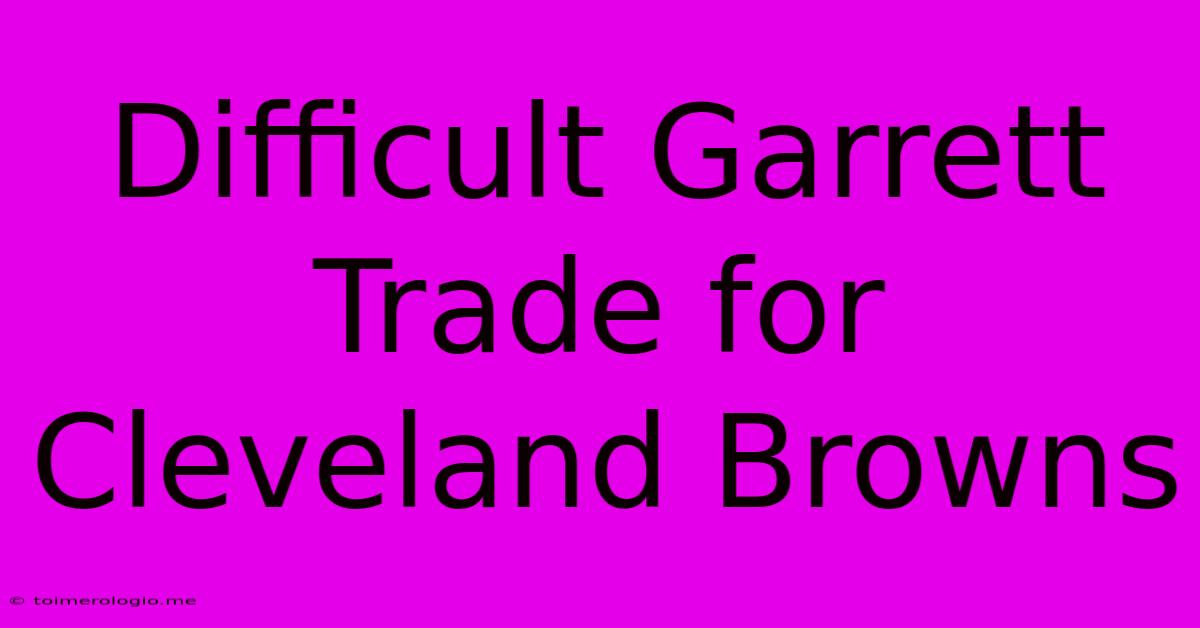Difficult Garrett Trade For Cleveland Browns

Discover more detailed and exciting information on our website. Click the link below to start your adventure: Visit Best Website toimerologio.me. Don't miss out!
Table of Contents
The Difficult Garrett Trade: A Cleveland Browns Conundrum
The Cleveland Browns' acquisition of Myles Garrett in the 2017 NFL Draft was a resounding success. The talented defensive end quickly established himself as one of the league's premier pass rushers, a cornerstone of the Browns' defensive line, and a franchise player. However, the future of Garrett in Cleveland, and the potential complexities of trading him, presents a fascinating and difficult scenario for the Browns' front office. This article delves into the intricacies of a potential Myles Garrett trade, analyzing the challenges, the potential benefits, and the overall implications for the Browns' future.
The Allure of a Myles Garrett Trade: Why It's Even Considered
Before exploring the difficulties, let's address the elephant in the room: why would the Browns even consider trading their star defensive end? Several factors contribute to this complex question:
Contractual Considerations:
Garrett's contract is a significant factor. While a top-tier player deserves a hefty salary, the Browns’ salary cap situation might necessitate difficult choices. A massive contract extension for Garrett, while beneficial for player retention, could restrict the Browns’ ability to build a competitive roster around him. Trading him could free up significant cap space to address other needs, perhaps bringing in multiple high-impact players.
Building a Contender:
The Browns haven’t won a Super Bowl in decades, and despite some successful seasons, a championship still seems a distant goal. The front office might conclude that maximizing their assets, even if it means parting with a superstar, is the best route to building a truly championship-caliber team in the long run. A trade involving Garrett could potentially net multiple high draft picks and/or established players to accelerate the rebuilding process.
Unforeseen Circumstances:
While less likely, unpredictable events, such as injuries or a significant drop in performance, could force the Browns to re-evaluate Garrett's value. While unlikely given his track record, a substantial downturn in form or a severe injury could dramatically alter the equation, making a trade a more palatable option.
The Immense Challenges of a Garrett Trade: Why It's So Difficult
Despite the potential benefits, a Myles Garrett trade presents significant hurdles that make it an exceptionally challenging undertaking:
Finding a Suitor Willing to Pay the Price:
Garrett's value is undeniably high. Any team interested in acquiring him would have to offer a king's ransom. We're talking multiple first-round draft picks, possibly additional high-value picks, and potentially established players. Finding a team willing to part with such a significant haul is a monumental task. Few teams possess the necessary draft capital and roster flexibility to make a compelling offer.
Garrett's Elite Status:
His exceptional talent makes him incredibly valuable. He's a game-changer, a force of nature who consistently impacts games. Losing a player of his caliber would leave a massive hole in the Browns' defense, a hole that would be incredibly difficult to fill. Replacing his pass-rushing prowess, leadership, and overall impact would require a Herculean effort and likely wouldn't yield the same immediate results.
Public Relations Nightmare:
Trading a beloved franchise player like Garrett would be unpopular among Browns fans. It would likely trigger a wave of criticism, potentially impacting ticket sales, merchandise sales, and the team’s overall image. The Browns' front office would need to carefully manage the public perception surrounding such a trade to minimize negative consequences.
Evaluating Potential Trade Packages: What Would the Browns Demand?
Speculating on a potential trade package is a fun exercise, but it’s important to remember that any such deal would be incredibly complex. The Browns would almost certainly demand:
- Multiple First-Round Picks: At least two, possibly three, first-round picks would be the bare minimum.
- Additional High-Value Picks: This could include second-round picks, or even a high-value third-rounder.
- Established Players: The Browns would likely want established, proven players in return, ideally players who fill immediate needs on their roster.
The Long-Term Implications: A Risky Gamble?
A Myles Garrett trade represents a significant gamble for the Cleveland Browns. While it could potentially accelerate the team's championship window, it also carries considerable risks. The Browns would need to be exceptionally confident in their ability to effectively replace Garrett's production and leadership through the incoming players and draft picks. Failure to adequately replace him could set the franchise back years.
Ultimately, the decision to trade Myles Garrett would hinge on a complex equation: weighing the potential short-term benefits of additional draft capital and roster flexibility against the significant long-term risks of losing a generational talent. It's a decision that would have profound implications for the Cleveland Browns and their aspirations for Super Bowl contention. The difficulty of this trade, both logistically and strategically, emphasizes just how valuable Myles Garrett truly is to the organization. Any team considering such a move needs to be fully aware of the enormous challenge ahead.

Thank you for visiting our website wich cover about Difficult Garrett Trade For Cleveland Browns. We hope the information provided has been useful to you. Feel free to contact us if you have any questions or need further assistance. See you next time and dont miss to bookmark.
Also read the following articles
| Article Title | Date |
|---|---|
| Espn Browns Garrett Trade Challenges | Feb 04, 2025 |
| Garretts Trade Request Browns Respond | Feb 04, 2025 |
| Tatum Leads Celtics Victory Over 76ers | Feb 04, 2025 |
| Mazzullas Pre Season Celtics Challenge | Feb 04, 2025 |
| Browns Defensive End Garrett Asks Trade | Feb 04, 2025 |
